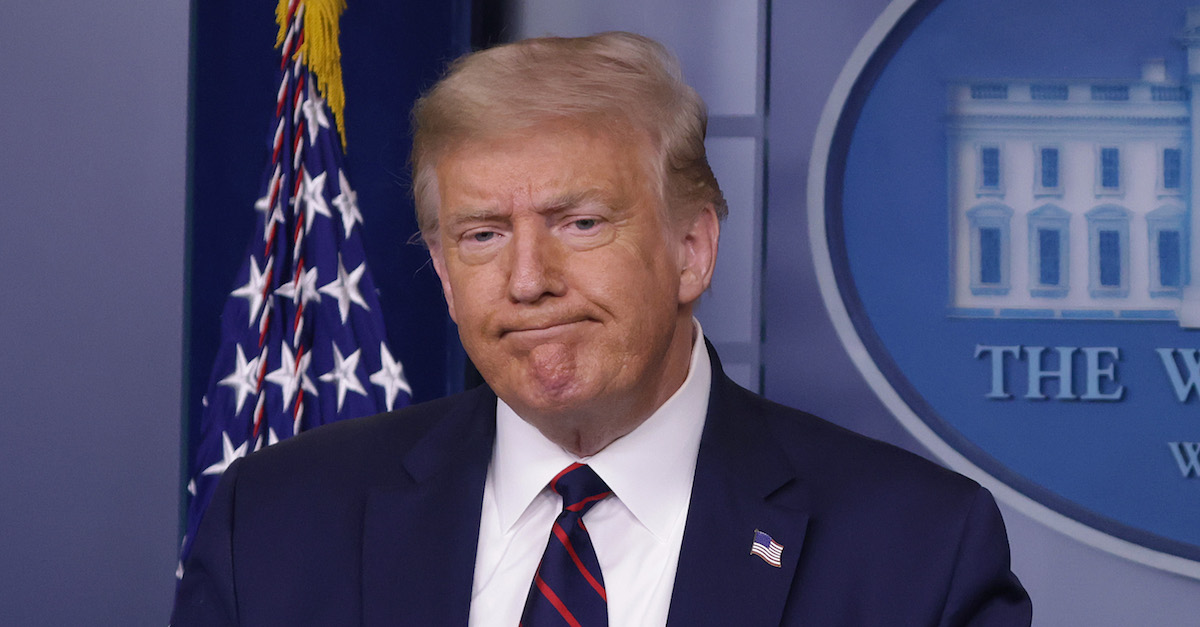
As President Donald Trump and his political acolytes continue efforts to sow doubt about the 2020 election, the editors of the conservative magazine National Review on Monday published a scathing piece disavowing the president’s “petulant” refusal to accept the reality of his loss to President-elect Joe Biden.
Headlined Trump’s Disgraceful Endgame, the editorial from the conservative publication didn’t pull any punches in going after the president, who has unapologetically used his massive platform to spread false conspiracy theories about widespread voter fraud despite mountains of evidence to the contrary. The president’s refusal to acknowledge Biden’s victory has also given rise to literally dozens of nonsensical lawsuits that have taken over state and federal courts in Pennsylvania and Nevada, resulting in an unprecedented string of losses and humiliating rulings.
The conductor of this off the rails train, National Review stated, is the president himself.
The chief driver of the post-election contention of the past several weeks is the petulant refusal of one man to accept the verdict of the American people. The Trump team (and much of the GOP) is working backwards, desperately trying to find something, anything to support the president’s aggrieved feelings, rather than objectively considering the evidence and reacting as warranted.
Trump’s campaign has repeatedly said one thing in the court of public opinion and another in a court of law. In court, Trump lawyers have either refused to make claims of voter fraud or filed embarrassing lawsuits that made waves for their mistakes rather than their arguments.
“Almost nothing that the Trump team has alleged has withstood the slightest scrutiny. In particular, it’s hard to find much that is remotely true in the president’s Twitter feed these days. It is full of already-debunked claims and crackpot conspiracy theories about Dominion voting systems,” the National Review editors said “Elected Republicans have generally taken the attitude that the president should be able to have his day in court. It’s his legal right to file suits, of course, but he shouldn’t pursue meritless litigation in Hail Mary attempts to get millions of votes tossed out.”
The editors concluded that Trump’s “most reprehensible” tactic has been to leverage the power of his office to ensnare politicians in swing states to continue promulgating his conspiracy theories—like courting Republicans from Michigan’s state legislature to visit White House in a transparent attempt to convince them to challenge the state’s vote tally.
Another example is Pennsylvania State Senator Doug Mastriano, who over the weekend announced that he and his colleagues in the GOP-led state legislature have planned to introduce a resolution to appoint a new slate of electors to cast the state’s Electoral College votes next month — in essence an attempt to undo the certified results of the 2020 election in the commonwealth. The ploy was immediately panned by constitutional law and election law experts.
It’s past time that Trump ended his war on the 2020 election, National Review editors concluded:
Getting defeated in a national election is a blow to the ego of even the most thick-skinned politicians and inevitably engenders personal feelings of bitterness and anger. What America has long expected is that losing candidates swallow those feelings and at least pretend to be gracious. If Trump’s not capable of it, he should at least stop waging war on the outcome.
[image via Alex Wong/Getty Images]